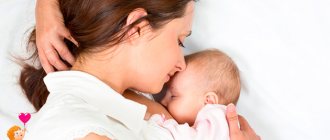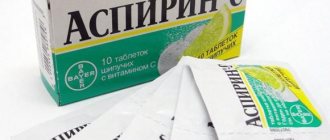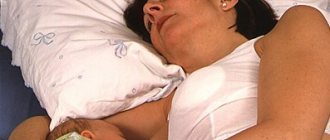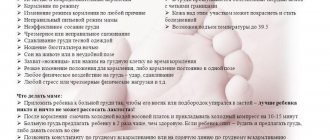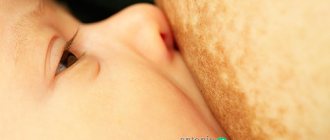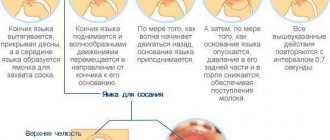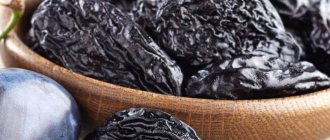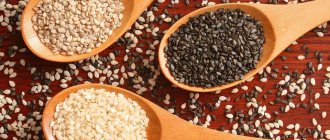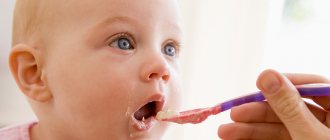Breastfeeding during poisoning
First of all, you need to understand what kind of poisoning we are talking about. If a nursing mother has been poisoned by chemicals or a large dose of any medication, then in this case it is impossible to give the baby breast milk. After all, most medications and toxic chemical compounds are absorbed into the blood and easily enter the mammary glands.
In case of food poisoning (or toxic infection), you can breastfeed your baby without fear. This disease is caused by bacteria and their waste products that enter the gastrointestinal tract (GIT) from poor-quality, expired or poorly washed food. The microorganisms themselves do not enter the bloodstream, and their toxins are only partially absorbed and practically do not penetrate the mammary glands. In addition, from the first day of illness against pathogenic microbes, the mother’s body begins to produce antibodies, which are passed on to the baby through milk. This process contributes to the proper development of the infant's immunity.
Important!
If a woman has to take serious antimicrobial medications to fight an infection, breastfeeding should be suspended during treatment.
Breastfeeding when mother is unwell
When poisoning occurs during breastfeeding, the question arises about the possibility of continuing it. The first concern is the safety of the child. The absence of mother's milk poses a threat to the baby's health.
In these cases, doctors approach the decision individually, taking into account the degree of damage to the mother’s body and the severity of intoxication. The possibility of breastfeeding in case of food poisoning is being explored. What decision is being made?
- If there is a slight lesion in a woman’s body, breastfeeding does not stop. It is planned to increase the intervals between breastfeeding.
- If moderate or severe poisoning is observed inside the body, it is undesirable to continue keeping the baby on breastfeeding during this period, so as not to worsen the condition. The baby is not put to the breast until the mother has completely recovered.
By nature, human milk contains substances that protect the child’s body. Toxic compounds are eliminated when their content and danger do not exceed a critical value.
When intoxication is severe and a clear clinical picture is observed, the toxin is passed on to the baby through breast milk, causing significant damage to health. At the same time, the mother becomes a source of infection for the child.
In this case, the nursing mother is not recommended to continue feeding; the baby is transferred to artificial feeding. It is advised to isolate the child from the infected woman during the period of therapy.
The woman is transferred to hospital treatment, and antibacterial medications are prescribed. When carrying out therapeutic measures for intestinal poisoning using medications, these substances enter the milk, which creates a danger for the baby.
To prevent the loss of breast milk and restore the baby's feeding, pumping should not be interrupted. After stopping antibiotics, at least 3 days must pass before the mother can give milk. During treatment for severe poisoning, it is recommended to increase the intake of liquids that stimulate the lactation process so that after treatment the baby receives the necessary amount of nutrition.
It happens that doctors categorically forbid a nursing mother to give milk to the baby. In this case, the severity of intoxication does not affect this decision. This happens in the following cases:
- The woman was diagnosed with botulism infection.
- Chemicals entered the body. We are talking about salts of heavy metals and drugs.
- CO2 poisoning.
- If treatment is carried out with antibiotics aimed at combating a wide range of bacteria.
When diagnosing intoxication, the decision to feed or interrupt breastfeeding is made by the doctor together with the woman.
Dr. Komarovsky often answers similar questions: am I breastfeeding a child, what is acceptable to take in case of poisoning, what painkiller? Answer: Paracetamol and Ibuprofen can be mentioned as relatively safe medications. Ideally, green tea and paracetamol help with pain.
Symptoms
Symptoms of food poisoning appear within 2 days after eating low-quality food. A woman appears:
- Diffuse abdominal pain;
- Severe nausea and repeated vomiting;
- Repeated loose stools;
- High fever;
- General malaise, weakness;
- Pain in the temples, joints, muscles as a manifestation of intoxication syndrome.
Symptoms of food poisoning
Signs of poisoning depend on what pathogen has entered the child’s body. Typically, the disease develops as follows: the pathogen enters the gastrointestinal tract along with poor-quality food, bacteria begin to actively develop, releasing waste products into the intestines. As a result, acute intoxication develops and the first symptoms appear:
- painful abdominal cramps, which may be accompanied by bloating and increased gas production;
- frequent loose stools. Foreign inclusions may be observed in the stool - a large amount of mucus, blood, stool may be greenish, foamy;
- nausea and vomiting.
At the same time, the temperature rises to 38-38.5℃. Children become lethargic, capricious, and refuse to eat. Newborns may cry loudly non-stop and pull their legs towards their tummy. Often food poisoning in children is accompanied by symptoms from the nervous system: headache.
Other signs and speed of development of the disease depend on what pathogen has entered the child’s body:
- Staphylococcus aureus. The bacterium develops in cooked food if storage conditions are not met. May be found in prepared meats, baked goods, and sandwiches. Poisoning manifests itself within 30-60 minutes after eating low-quality food, cramping abdominal pain, diarrhea and vomiting appear;
- clostridia. The pathogen is most often found in beef and pork, especially in large hams, when it is not possible to completely cook the core. The infection is characterized by a sudden onset: diarrhea and minor abdominal pain appear, without nausea or fever;
- norovirus. It lives on green leaves, fresh fruits, and can be found in raw shellfish. The first signs appear after a day. The child begins to complain of loose, painful stools, frequent urge to defecate, and severe nausea;
- salmonella. Found in unprocessed milk, eggs, and chicken. Infection causes high fever up to 38.5℃, diarrhea, vomiting, accompanied by severe cramping abdominal cramps;
- coli. It lives in unpasteurized milk and juice, and is found in beef meat. The main difference between poisoning is the appearance of blood impurities in the stool. There is a high probability of developing renal failure;
- botulinum toxin. It is found in improperly prepared pickles and marinades. If botulism develops, the functioning of not only the gastrointestinal tract, but also the nervous system is disrupted: the patient complains of blurred vision, it is difficult for him to control his limbs and turn his head.
Any malaise and a child’s complaints of pain in the abdomen are an alarming symptom. It is recommended to call an ambulance immediately.
Treatment rules for breastfeeding
Mild poisoning can usually be managed without taking antibiotics. The sooner you start treatment, the higher the chance of defeating the disease on your own.
Drinking regime
To relieve intoxication, drink at least 2 liters of fluid per day. Non-carbonated mineral water or weak herbal tea will do. You will have to temporarily give up soda, coffee, and fruit juices.
If repeated diarrhea and vomiting are observed, then to replenish the volume of electrolytes and carbohydrates, you need to use oral rehydration products - Orosan, Gastrolit, Rehydron.
In case of constant vomiting, you need to drink in small portions, but more often, in order to get the required volume of liquid without provoking vomiting. Water that is preheated to body temperature (about 37 °C) is absorbed most quickly.
Diet for poisoning
On the first day of food poisoning, it is recommended to observe complete fasting. If the disease is mild, then it is permissible to have a small snack with soaked crackers, oatmeal or rice porridge cooked in water.
In the future, a strict gentle diet is indicated, which involves avoiding heavy and irritating foods to the gastrointestinal tract. These include:
- Fatty meats and fish;
- Pickles and marinades;
- Smoked meats;
- Fried foods;
- Spicy seasonings;
- Raw fruits and vegetables;
- Alcoholic drinks.
It is best to eat steamed lean dishes, oatmeal, buckwheat, rice porridge, and jelly.
The doctor's consultation
A doctor's examination is needed in the following cases:
- Diarrhea and diarrhea do not stop, and there is a risk of dehydration;
- Lethargy and depression of consciousness are observed;
- Vision is impaired;
- The high temperature persists, which cannot be brought down with standard antipyretics;
- An admixture of blood appears in the vomit or feces.
Before starting treatment, be sure to notify your doctor that you are breastfeeding.
Rest
In case of food poisoning, a woman is advised to go to bed. If there is an assistant in the house (husband, grandmother, grandfather, nanny), then it is better to limit the mother’s contact with the child only during feeding periods.
If the mother has to cope alone, then most of the time she should be in bed, if possible, with the baby next to her. Keep his attention busy with an interesting toy or picture book. When the baby sleeps, it is advisable to fall asleep with him.
Causes of food poisoning
The most common culprits of poisoning are:
- dirty hands;
- vegetables and fruits that have not been pre-washed;
- poor quality water used for drinking or washing fruit, ice cubes;
- products, especially dairy and confectionery products with cream, that were improperly stored or expired;
- undercooked meat, raw eggs;
- poisonous berries and mushrooms;
- canned food prepared in violation of technology.
Feeding precautions
To prevent the infection from being transmitted from mother to baby, during illness special attention should be paid to the rules of personal hygiene:
- Wash your hands every time before picking up your baby, expressing milk, or preparing complementary foods.
- Do not dry your baby with your towel.
- Do not let your baby drink or eat from your dishes, and do not try feeding him with a spoon.
- Rinse your mammary glands before feeding.
- If you place your baby on your bed, place a diaper on top of the bedding.
Methods of treating intoxication in nursing mothers
A mother will be able to calmly feed her baby breast milk only if she feels normal. And for this, first of all, you need to relieve intoxication syndrome.
Method of gastrointestinal lavage
You can rinse your stomach at home by artificially inducing vomiting. To do this, first drink at least a liter of still water. Then you need to bend over the toilet and press the pads of the 2nd and 3rd fingers on the base of the tongue or on the back wall of the throat. This will provoke a gag reflex and the removal of food contaminated with bacteria and their toxins from the stomach.
Note!
It is advisable to artificially induce vomiting only within 2 hours after eating. If more time has passed, then toxins have time to be absorbed into the bloodstream, and most of the food is evacuated from the stomach.
After vomiting, you should rinse your mouth with water to wash away the hydrochloric acid that has entered the stomach cavity.
Detoxification methods using sorbents
Enterosorbents are drugs that bind bacteria and the toxins they secrete, and then quickly remove them from the body, preventing damage to the gastrointestinal tract. Another useful property of sorbents is the antidiarrheal effect. These are the safest medications to combat poisoning that you can safely drink during lactation.
The most effective and easy-to-use sorbing agents are smecta, polysorb, enterosgel. You should drink them until all symptoms of the disease subside.
Symptomatic treatment
To normalize body temperature during lactation, ibuprofen and paracetamol are allowed. It is advisable to reduce the temperature if it exceeds the threshold of 38.5 °C. In other cases, it performs a protective function.
To combat diarrhea, it is possible to prescribe enterol containing Saccharomycetes. The average duration of treatment with this drug is 7 days.
The most popular anti-diarrhea drug, Imodium, is not advisable to drink while breastfeeding. We can only take it once.
Antispasmodics (no-spa, drotaverine) and antiemetics (cerucal, motilium) are also allowed to be taken 1-2 times. At this dose, they will not be able to harm the baby, even if they get into the milk.
There are some antibacterial agents that are allowed during breastfeeding. These include, for example, the intestinal antibiotic alpha normix. However, such treatment must be agreed upon with a doctor.
Preventive measures for breastfeeding women
To avoid having to treat poisoning during breastfeeding, the easiest way is to pay attention to preventive measures:
- Wash vegetables, fruits, eggs thoroughly before eating;
- Throw away products that have passed their expiration date;
- Wash your hands before every meal;
- Rinse dirty dishes well;
- Do not buy shelf-stable products whose packaging has been damaged;
- Do not drink unboiled water from questionable sources;
- Thoroughly boil and fry meat and fish dishes;
- If food has an unpleasant odor or tastes unusual, it is better to avoid it.
Emergency measures
Emergency care for food poisoning in a nursing mother involves gastric lavage and taking enterosorbent. If a woman is poisoned by medications or toxic chemicals, you should immediately call an ambulance, and while waiting, also induce vomiting.
Attention!
Do not try to rinse your stomach yourself if you are poisoned with aggressive solutions of acids and alkalis. Their repeated passage through the esophagus will intensify its chemical burn.
